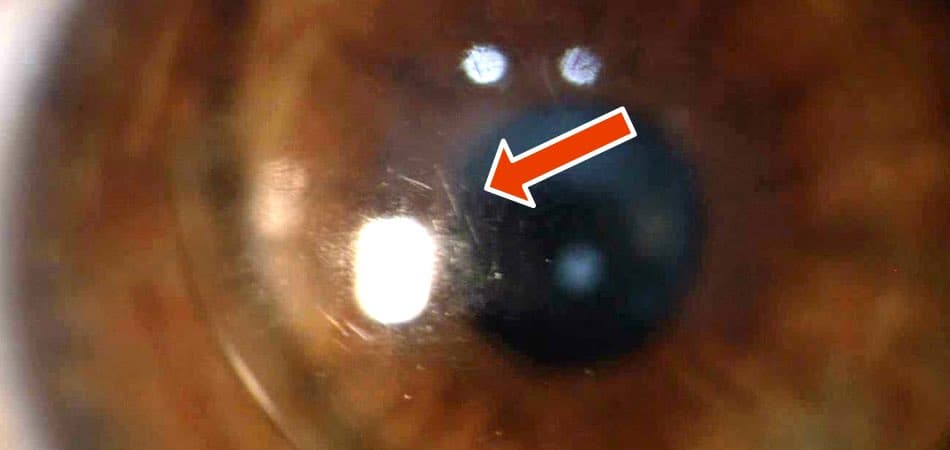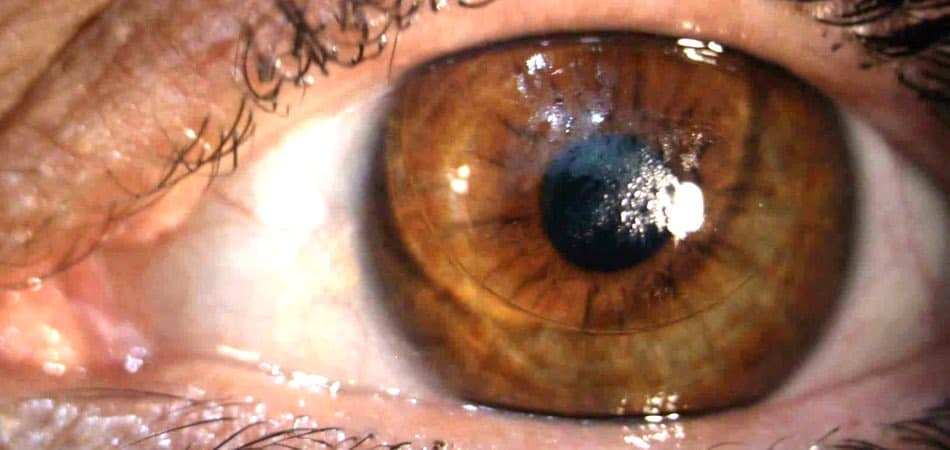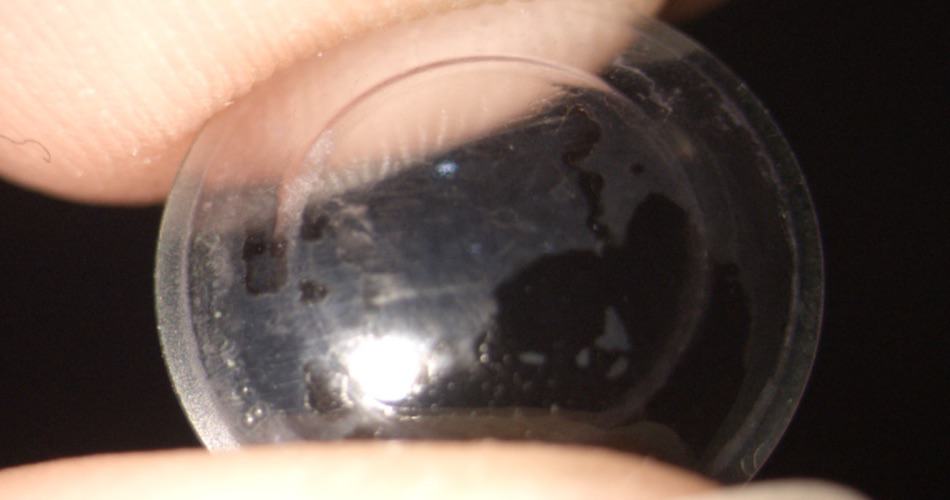Hard contact lenses can wear out. The lens surface as well as the shape of the contact lens may change over time. As the materials improved over the years used with hard (RGP) contact lenses have gotten less durable. This means high-end hard contact lenses need to be replaced more often. Depending on the usage of the lens replacements from 12 months up to 2 years are recommended.
When the contact lens reaches the end of the life cycle the wearer can see more glare at night and more fluctuations in visual acuity. One of the reasons can be found in the image of a worn-out rigid gas permeable lens. The contact lens has some scratches on the surface. Depending on where those scratches are and how the lens is positioned on the cornea the person wearing the lens might see them or not.

A slightly blurry visual experience will be the result of a worn-out lens ins some cases an increased foreign body sensation too. When the scratches accumulated heavily on the lens surface wetting issues start to come up. As you can see in the picture below dry spots appear on the worn-out lens. The person wearing those lenses reported a permanent smear on the lens. In some cases after blinking it was good for a second and after blinking visual acuity was bad again.
Those fluctuations in visual acuity are typical for a worn-out lens. When wetting issues are visible on the lens surface accumulation of debris also comes along with the uneven surface. Some components of the tear film stick to the areas with the scratches and lead to increased friction. Every time the lid wipes the lens this friction is increased in comparison with a new lens.

How to Spot a Worn Out Lens?
Usually, opticians use a slit lamp (a specialized microscope) to check the wetting and the lens surface. But when it is worn out oftentimes even an outsider to the optical industry can tell if the light does not shine perfectly through the lens. When the lens is held between the eye and a light source the light source should be visible through the lens. But when cloudy spots are visible that can not be removed with contact lens cleaning agents or with a specialized polishing paste it is time to buy a new lens.
In the image below you can see a defective surface on a hard contact lens. This contact lens needed to be replaced after 12 months. While it is not ok that the surface broke down of the lens it is totally normal for an Ortho K lens to be replaced after a year. This lens is worn only at night and shapes the eye so the person sees clear at day with glasses or contacts.
With the new materials, this is usage became more publicly available because the lens material (here optimum extreme from Contamac) is shown to have excellent oxygen permeability but therefore it is less durable. Opticians should do a better job explaining this to their customers. Because when the wrong cleaning agent is used only one or two times with the new cleaning agent is enough to break the surface.

Why Do My Contacts Wear Out so Fast?
When your contact lens wears out faster than the given manufacturer’s information the reason, therefore, is oftentimes found in the wrong cleaning agent for the particular lens. There are a bunch of solutions out there for your contacts. And if the wearer of contacts read it is for soft or hard contact lenses they think that is all information they need and the bought solution will work with their lenses.
But oftentimes people do not know that if the cleaning agent is not compatible with their lens the contacts will wear out faster. And with faster I mean in some cases the wrong cleaning agents shed the time you have with the contacts in half before problems come up.
So one of my customers knew she should ask us if the contact lens care product was compatible with her lenses before switching. She stayed for a few months elsewhere and bought the weekly protein remover. It is a disinfectant and intensive cleaner that is officially compatible with all GP contact lenses.
While this is true for uncoated rigid gas permeable lenses this cleaner should not be applied to her lens which was coated with the tangible hydra PEG coating. Progent is great but in this case, it damaged the coating reduced the great wetting capabilities.
Even when the contacts are not coated with an abrasive cleaning solution you can expect to shed a few months of usage from the life cycle of your contacts. So the question is it really necessary to use those cleaners or would another cleaner just as good.
As a master optician, I can not give general advice here. It is important to look at the tear film and then choose the lens material as well as the cleaner wisely. So ask yourself do you actually know if your cleaner is compatible with your lenses. Do you stick to your cleaning regimen and do you use contact lens cleaners only recommended by your contact lens specialist?
I often saw a problem with faster worn-out contacts when customers tried to use tap water to rinse the lenses. In the tab, water can for example harder or softer depending on the amount of calcium carbonate in the water. When water comes into contact with the lens surface the coatings were damaged more often despite the greater risk of infections.
The optician or optometrist should go with you briefly through the cleaning process when you visit the eye care professional. Only with those little reminders, your contact lenses will not wear out as fast. For example, I had a customer who became wetting problems.
I wondered why all of a sudden and what this person did is he rubbed the lenses when they were dry and then stored them in the case with the cleaner. Of course, the increased friction will lead to a faster breakdown of the lens’s surface. I showed this step always with saline in the shop but all of a sudden this process was changed.
Do you place your contacts on a table when putting them on or out or do you place them on a soft towel? Prevent your contacts form mechanical strain so you can wear them for as long as they should worn.
How Easily Do Hard Contacts Break?
Sometimes it does not take much and a rigid gas permeable contact lens breaks. Those contact lenses are extremely thin and although you will feel them they are highly optimized for comfort not as much for durability. When you twist hard contacts or apply a little pressure to them why they are on a flat surface they will easily break.
Nobody is person that is why we constantly remind ourselves of this little things. I hope your contact lens care runs well.
I wish you a great day.
